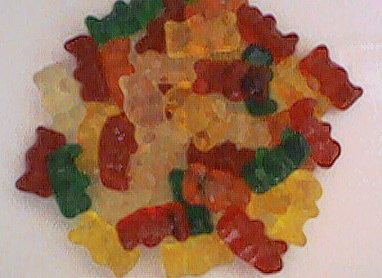
Purpose: To investigate the movement of water into and out of a polymer. Gummy Bears are made of gelatin and sugar. Gelatin is a polymer that forms large three-dimensional matrices which give structural support to jellies and jams, and lots of other things that you use every day.
Hypotheses:
- If someone places Gummy Bears in tap water, then the size of the bears will (increase, decrease, remain the same). Circle your answer.
- If someone places Gummy Bears in distilled water, then the size of the bears will (increase, decrease, remain the same). Circle your answer.
Materials: for pairs of students
- 2 - plastic cups (8oz)
- permanent marker
- 2 - aluminum or plastic screens (4"x4")
- 2 - Gummy Bears (different colors)
- distilled water
- saturated salt solution (6 oz per cup)
- tap water
- 2 - centimeter rulers
Safety Considerations:
There are no safety hazards with
materials used in this experiment. The filters may become moldy after
storage
for several days or more. If that occurs, they should be disposed
of in the trash.
Procedure
- Obtain two plastic cups, two different colored Gummy Bears and two rulers.
- On the side of each cup, write your name and class period using a permanent marker.
- Label one cup "TAP WATER" and the other "DISTILLED WATER".
- Measure your bear (in cm) from top to bottom (length) and from side to side (width) and from front to back (height). Record the centimeters in the data table. Use decimals.
- Place the bears in the cups and cover one with distilled and one with tap water.
- Place the cups on the counter away from direct sunlight. Let them sit overnight.
- On the next lab day, gently pour the water over a screen into a sink. Catch each bear on a separate screen.
- While on the screen, measure the length, width, and height. Record. Blot the screen dry by placing it on a paper towel. BE CAREFUL not to break the bears, they are very fragile.
- Place the bears back into their correct cups. Cover the bears with saturated salt solution. Let them sit overnight.
- Find the dimensions of the bears and record. Calculate the volumes (l x w x h).
Data Table for Dimensions in centimeters: (Use decimal numbers.)
Gummy Bear in Tap Water
| Length | Width | Height | Volume | |
| Before Water | ||||
| After Water | ||||
| After Salt Water |
| Gummy Bear in Distilled Water The bears on the right show sizes of dry and wet bears. |

The before and after water bears. |
| Length | Width | Height | Volume | |
| Before Water | ||||
| After Water | ||||
| After Salt Water |
Conclusions:
- What happened to the bears when placed in distilled water? Why?
- What happened to the bears when placed in tap water? Why?
- What happened to the bears when placed in salt water? Why?
- What do you think would have happened to the bears if, after the last day, they were again placed in distilled water?
- Calculate the percent change in volume after each step of the experiment.
% change in volume = (final volume - initial volume)/ initial volume x 100 - Place the percentages in the table below:
Bears % Change in Water % Change in Salt Water Tap Water Bear Distilled Water Bear
- Make a bar graph of the percent changes. Label axes. Place a scale on the vertical axis for percent change and give a title for the graph. Place the data for both bears on the same graph. USE GRAPH PAPER. If you have a negative value for a percent change, start the vertical axis at a negative number. (For example: -50, -25, 0, 25, 50, 75, 100, etc.) An example of the horizontal axis is below:
Tap
WaterSalt
WaterDistilled
WaterSalt
Water
- Write a paragraph which explains the results of this experiment using the concepts of diffusion and swelling. Think about how fast changes like these take place (kinetics and rates of diffusion) and how much swelling can occur (equilibrium and limiting swelling volume). Include your data where appropriate to explain your results and conclusions.
Teacher Notes
Written by Mary Harris, Missouri Polymer Ambassador, email: [email protected]
Video editing by James Brownlow from George County High School, Lucedale, MS
PSLC OFFERS THIS SITE AS AN EDUCATIONAL TOOL. PSLC IS NOT RESPONSIBLE FOR ANY INJURY OR DAMAGE CAUSED TO ANY PERSON, DIRECTLY OR INDIRECTLY, RELATING TO ANY OF THE DEMOS OR EXPERIMENTS LISTED AT THIS SITE. YOU ARE WHOLLY RESPONSIBLE FOR YOUR SAFETY.

|
Return to Labs Page |

|
Return to Level Three |